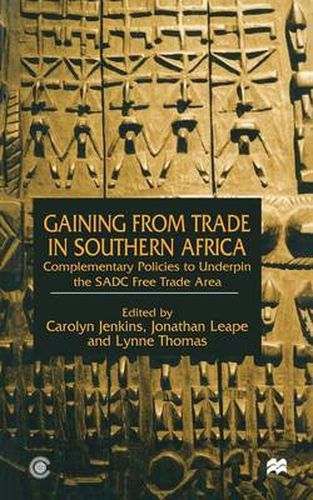Readings Newsletter
Become a Readings Member to make your shopping experience even easier.
Sign in or sign up for free!
You’re not far away from qualifying for FREE standard shipping within Australia
You’ve qualified for FREE standard shipping within Australia
The cart is loading…






This title is printed to order. This book may have been self-published. If so, we cannot guarantee the quality of the content. In the main most books will have gone through the editing process however some may not. We therefore suggest that you be aware of this before ordering this book. If in doubt check either the author or publisher’s details as we are unable to accept any returns unless they are faulty. Please contact us if you have any questions.
Policy-makers in Southern Africa are increasingly convinced that regional trade liberalization can improve growth performance and stimulate development throughout the region. To succeed where previous attempts have failed, however, governments must address two key issues. The first of these is policy coordination - the broad range of domestic policies must be made compatible with the proposed trade reforms. The second is institution building - concerted attention must be devoted to strengthening weak institutions and infrastructure. The contributors are among the leading authorities on regional integration in Africa.
$9.00 standard shipping within Australia
FREE standard shipping within Australia for orders over $100.00
Express & International shipping calculated at checkout
This title is printed to order. This book may have been self-published. If so, we cannot guarantee the quality of the content. In the main most books will have gone through the editing process however some may not. We therefore suggest that you be aware of this before ordering this book. If in doubt check either the author or publisher’s details as we are unable to accept any returns unless they are faulty. Please contact us if you have any questions.
Policy-makers in Southern Africa are increasingly convinced that regional trade liberalization can improve growth performance and stimulate development throughout the region. To succeed where previous attempts have failed, however, governments must address two key issues. The first of these is policy coordination - the broad range of domestic policies must be made compatible with the proposed trade reforms. The second is institution building - concerted attention must be devoted to strengthening weak institutions and infrastructure. The contributors are among the leading authorities on regional integration in Africa.